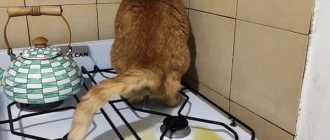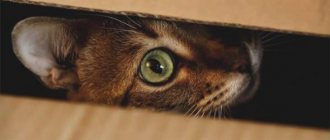Save the article:
Owners obviously do not bring cats into the house for the purpose of running around with floor rags and wiping up foul-smelling puddles left anywhere. to stop a cat from crapping : the peace of mind in the house and the comfortable coexistence of the family with the furry pet depend on it.
Furry pets can go to the toilet in flower pots, under and on the bed, on the carpet and in new shoes. A little more, and the apartment will become a cat's litter box...
When a cat shits in the wrong place, and does it with enviable consistency, any owner can lose his nerve. But you shouldn’t immediately scold the guilty purr, but take a closer look at the animal’s behavior and understand the reasons for the wet crime.
Peeing in the tray and pooping next to it - what is the reason?
Tailed fluffies know how to surprise with their ingenuity and skills, but sometimes their owners receive truly unpleasant surprises from them. Although cats are considered one of the cleanest animals, they also have strange embarrassments - the pet relieves itself in the tray, but prefers to poop by.
Why does this happen, is it worth punishing this cat, or should we first figure out what motivates her to commit such an atypical act? The main reasons for this behavior in cats:
- various diseases;
- prolonged constipation;
- instincts;
- preference for certain toilet fillers;
- psychological problems;
- cleanliness issues.
No matter how paradoxical it may sound, the reason that a cat pees in the litter box and poops past it is the absolute cleanliness of the animal. Some cats are so protective of their cleanliness that they will not go into a litter box that is not regularly treated with antiseptic agents.
If a cat pees in the litter box and poops past it, the first thing the owner is recommended to do is to carefully ensure that the toilet is always clean and does not contain foreign, unpleasant odors. To do this, just treat the tray with vinegar.
Recommendations
If a kitten was taken from the street, it had no restrictions in choosing where to defecate. Then you may not understand the prohibition against peeing in bed.
To wean a kitten in a week, read the recommendations:
- Make your animal uncomfortable when it is about to urinate on the bed. Scare him with aluminum foil in bed. A kitten will come, get scared by the rustling sound and run away.
- Play with your pet on the bed, they sleep together. Thus, you will understand that “a bed is not a bath.”
- Place your kitten's litter box in a special place in the house.
- To prevent the kitten from peeing, blot it with a damp cloth, spray water from a spray bottle on its face, and then immediately transfer it to the tray. When you finish your business there, pet and praise.
- Cats are repulsed by strong odors. Place a packet of lavender or any other strong-smelling ingredient on your bed. Avoid experiments with oregano and mint, they attract animals.
- The kitten may see its owner as its mother cat. When they are together, the child urinates in the sand. In the house you can switch to a soft bed.
- The tray should be comfortable, long and roomy enough so that you can easily spread it out.
- If the little kitten has managed to do its job on the bed, you will still have to bring it to the litter box, but you cannot show affection or kindness. Express disagreement with their behavior while leaving them to “think about their actions.”
- Until the animal has firmly learned that it only needs to go to the litter box, forbid it from sleeping in bed with you. A house and a sofa are suitable as an alternative to a bed. The toilet should be located next to them.
- The toilet needs to be made attractive, after cleaning it, treat it with a smart spray, then the kitten will be ready to go to the litter box again.
- Cats are clean and will not go into a dirty bathroom. A couple of sticky lumps may scare them away, change the filling or immediately remove sloppy lumps.
- Choose a litter that your kitten likes: clumping, absorbent, wood, silica gel.
- Sometimes the reason is that a particular blanket is attractive to the kitten, its texture is pleasant to the paws, especially if the tray provided by the owner is uncomfortable.
- Stress may be the cause. It occurs from moving, changing air, owners, or the appearance of other animals in the house. In this case, stroking and soothing herbal infusions will help. The doctor will tell you which one to choose.
- If the kitten begins to walk near the bed and urinate on chairs, sofas and armchairs, then this indicates health problems: cystitis, infections, problems with the urinary tract. At the same time, you will often pee, and sometimes you will not have time to run to the tray. You can find out why by contacting your veterinarian.
Preventive measures will not give the expected result if the kitten is sick or is bothered by changes that it does not understand. A patient and attentive attitude towards your pet in the face of any failure gives better results than physical punishment, screaming and threats. Pets are family members just like other family members. Comfortable living conditions, protection from diseases, a properly selected diet, a convenient and inexpensive potty will help to avoid problems and conflicts.
Specific events
How to stop a cat from shitting when it happens in certain places on a regular basis? Several such characteristic places can be identified. Nature directs the animal to pots with home flowers, where it is attracted by the soft soil, and even with the smell of fertilizer. Of course, the easiest way is to put the flowers out of reach of the cat. In cases where this is undesirable, the following methods of influence can be recommended: placing a garlic clove or lemon peels on the soil surface; covering the surface (usually a window sill) on which the pots stand with foil or taping the area near the pot; placement of twigs around the perimeter of the pot, creating an interfering fence (toothpicks can be used). Such inconveniences will wean the animal from unscheduled toileting, and after a while all elements can be removed.
Vinegar will help stop your pet from pooping in the litter box.
On a note! If a cat gets into the habit of shitting on the bed, then measures must be taken as quickly as possible so that such comfortable conditions do not become a habit.
First of all, resolutely block the way to the bedroom by closing the door. Using lavender when rinsing bedding is considered a fairly effective method. You can simply apply a few drops of lavender oil to the top of your bed, especially at the head of your bed. Cats cannot stand the smell of lavender and will give up their intentions.
An animal can shit on the floor in different places in the apartment or run out into the entrance and defecate there. A vinegar solution can be considered an effective remedy. If you treat the floor with it, the cat will not make a toilet there. A positive result is achieved by using ready-made products intended for these purposes and sold in a pet store: Nature's Miracle, Odor-Secret, Nok-Out, Urine-Off. Sometimes the animal takes a liking to a certain corner in the apartment and does “its business” there. In this case, it is best to install a tray in this corner.
Nature's Miracle gives positive results
Finally, there is also a known radical way to stop a cat from crapping. The animal is locked in a small room (for example, a bathroom), where a tray is installed and a bowl of water is placed at a distance. To feed, the cat is taken to a bowl of food 2-3 times a day. The rest of the time she remains locked up and is forced to use the litter box. The cessation of isolation should be carried out gradually, as the animal gets used to the tray.
The question of how to wean a cat from shitting in the wrong place at home should be decided taking into account the reasons leading to this behavior of the animal. First of all, it is necessary to eliminate these causes and ensure maximum peace of mind for the cat. In the presence of diseases, the intervention of a veterinarian is necessary, but in other cases, a kind attitude towards your pet and patience will help.
How can I get my cat to stop pooping in the house?
Once you realize that your cat is messing around the house, your immediate reaction may be to find a solution as soon as possible. Well, above, I have outlined some of the most common reasons why a cat might suddenly start pooping in the house.
Below I will list ways to stop all this. Follow the tips below to avoid cat contamination in your home.
Clean cat litter
Earlier in this article, I mentioned that cats poop in the house because the litter box can be dirty. Cats have a fairly strong sense of smell. This means that she can detect even the slightest odor coming from the litter box.
And since cats are clean creatures, they will prefer to go somewhere rather than to a dirty litter box. Now, as I mentioned, make sure you clean up your trash every day. If you can, remove dirty litter every time your cat uses the litter box.
Also change the bedding at least once a week. This means you empty and wash the litter box before putting in a fresh litter box. Your cat will be able to enjoy using the box when it doesn't smell like stale waste.
Move the litter box to a more appropriate position
I mentioned that your cat may refuse to use the litter box due to poor positioning. Do you think his litter box has a lot of movement? Or can your guests see it while eliminating? If the answer to both questions is yes, then you need to move it. Your cat may be too preoccupied with the latter.
Cats prefer to hide in dark, quiet corners. So make sure you place the litter box in a positive environment to provide privacy and comfort.
Add an extra litter tray
Your cat should have several options for toiletries. Let me emphasize that your cat will not use a dirty litter box. Having multiple boxes allows your cat to use them as she pleases. Also, if you have two cats, you should already know that they don't like to share resources.
Buy a few toiletries and provide them to your cats.
© shutterstock
Limit access to previously contaminated surfaces
So, for some reason your cat likes to shit on the floor. I know it's annoying, but you have to be patient with minor accidents around the house. This is especially important if you are litter box training your kitten. It could take him weeks, sometimes months, to use the box.
Now, if your cat suddenly starts pooping on the floor, you should clean up the scene immediately. Use an enzymatic cleaner to thoroughly clean stains and remove odors. Well, the smell left in the house may encourage your kitten to defecate in the same place.
You can also cover the stain with aluminum foil. Since it is too uncomfortable for the cat's paws, she is unlikely to repeat it in that area.
Be patient
Getting a cat to stop shitting on the floor in the house is not an easy or quick task. In contrast, it may take months to get him to start using the litter box again. Therefore, you will need to be patient throughout this process.
This is the most common mistake made by cat owners. They give up too early, and some even surrender their cats to a shelter. Well, with proper training, patience, and consistency, your cat will eventually break the habit of soiling your house.
Take him to the vet
If you suspect your cat is sick, I encourage you to consult your veterinarian. If he can't reach the litter box, he may be feeling unwell. Lab tests should help determine whether your cat is unhealthy or if you are dealing with behavioral problems.
When talking about improper breeding and health problems in cats, I cannot help but mention cats with dementia. Older cats may have problems with dementia, causing them to poop abnormally. Sometimes your older cat may forget about toilet training or even the position of the litter box.
Well, if this is the case, you will need to learn how to manage and live with a cat with dementia.
Author of the article: Michelle Grover. I have been a pet owner most of my life. I am now retired and spend my days writing about issues related to cats, dogs and funeral poems. I am passionate about ending animal cruelty in any form. My passion is helping people like you identify behavioral problems in cats and dogs. That's what I'm doing. Throughout my life I have always owned cats and dogs. About 4 years ago I retired and found myself with a lot of free time, so I started writing all about dog and cat issues.
We exclude medicine
If the tray is always clean and smells quite pleasant, then why does the animal still not change its habit of ignoring it, defecating past it, as if out of spite? In this case, it is worth observing the animal, perhaps the development of various diseases is to blame.
The most common cause of strange cat behavior is the presence of frequent constipation in the pet. The cat begins to associate his toilet with unpleasant, uncomfortable sensations, which is why he prefers not to go to it.
Another reason for this behavior is related to the age of the cat - quite often older cats develop a disease such as arthritis. Due to joint pain and stiffness, they are simply unable to perch on a tray with high sides.
In addition, there are also psychological factors, for example, when the owner uses a closed house as a cat litter box. Of course, it looks interesting and aesthetically pleasing, it traps odors, but in most cases cats feel uncomfortable and uncomfortable in such houses, so they prefer to ignore it.
Medical aspect
And we will immediately exclude such a special group as uncastrated animals . Everything is very clear here. The riot of sex hormones simply pushes these innocent poor fellows to “bad deeds.” High hormonal levels and the associated stress explain both puddles in the wrong places and vertical odorous marks left for the sexual partner. As a rule, miraculous castration solves all problems. If it does not help, then the problem moves from the medical category to behavioral, which we will discuss below.
If a castrated animal begins to walk past the potty, then the possible cause is some kind of internal disease, for example, hyperthyroidism (increased function of the thyroid gland), inflammation of the intestines, colitis, constipation, hepatitis, diabetes mellitus, food allergies, neurological disease. But the main role, of course, belongs to diseases of the genitourinary system, in particular, lesions of the lower urinary tract - cystitis, urolithiasis, etc.
In older cats, there is a decrease in both physical abilities (joint diseases, deterioration of vision and smell) and brain activity (memory deterioration, movement coordination, coordination of actions, etc.), which also does not contribute to the impeccable management of natural needs. Urinary incontinence can be caused, for example, by atony, an age-related weakening of the muscles of the urethra and bladder.
Thus, the main cause of cat uncleanliness may be pain during urination or defecation, or the inability to perform these functions correctly. Therefore, first of all, the disease causing this behavior should be identified and treated.
So, before punishing a pet for “bad deeds,” you should find out if he has a good reason for this. As usual, we go to the doctor and get a diagnosis. As a last resort, we at least take the urine for analysis (if the problem is “incorrect” urination). If the clinic actually confirms any disease, we apologize to the pet for thinking badly about it and begin treatment.
And if the stars are favorable, then after eliminating the problem the cat will return to its toilet. BUT! It is possible that the cat will “associate” its painful sensations with the litter box, and the aversion to it will be fixed in its mind for a long time. That is, the medical aspect of the problem will degenerate into a behavioral one.
It should be noted that even if the doctor did not find physiological abnormalities in the pet, this does not mean that they actually do not exist. Maybe I really didn’t find it.
Lesions of the central nervous system
Unclean behavior can be a symptom of cognitive disorders - hydrocephalus in kittens, brain tumors and senile dementia (in older animals) or other damage to the cerebral cortex (cyst, ischemic encephalopathy).
In diseases of the central nervous system, there may be convulsions accompanied by involuntary urination. If, after your absence, you can detect urine, saliva and other unknown traces in the cat's resting areas, this may be a sign of seizure activity.
Cat owners may confuse urinary incontinence with unclean behavior (often people do not see, but simply feel that the bed linen smells unpleasant).
Neurological deficits can lead to loss of conscious urinary control (continuous leakage of urine throughout the day or leakage due to an overfilled bladder that the animal cannot empty on its own).
Such diseases begin to be diagnosed only when there are additional symptoms indicating damage to the central nervous system, or when all other possible causes have already been excluded.
Manifestation of cat instincts
Some pets' natural instincts are so pronounced that they cannot relieve themselves of small and large needs in one place.
This is explained by the fact that cats associate the process of urination with the process of marking their territory, which is why they begin to walk past the litter box when defecating.
How to get out of this situation? It is recommended to place two litter boxes for your pet, but not next to each other (this arrangement of toilets will not solve the problem), but at some distance - these can be different corners of the same room, and sometimes even different rooms. Only trial and error will help you achieve the ideal placement of two toilets.
Marks or shits: it’s important to know the differences
Males, females and a certain percentage of castrated cats mark their territory. They usually mark vertical surfaces: walls, door frames, curtains. A mark is not just urine, when a cat raises its tail, wags it and leaves a mark. The animal also leaves a mark with its claws, since between the fingertips there are glands that secrete a secretion. Rubbing the muzzle against objects is also a mark. A cat or cat can regularly go to the designated place, but at the same time leave marks. Therefore, “marks” and “shits” are different concepts.
Territory marking
Can't understand why a cat shits everywhere? Look out the window. It is likely that March has come and the cat has simply gone on a spree. Despite the fact that man domesticated the cat a long time ago, it still remains a wild creature. Therefore, they continue to communicate with the opposite sex like animals, through smells.
During heat, a cat may begin to shit in corners, unconsciously trying to attract cats with her scent. Male individuals also mark territory, thereby showing the boundaries of their possessions.
There are several ways to solve the problem:
- Give the animal what it wants - find a mating partner.
- Use hormonal drugs to reduce libido. They should be selected by a specialist.
- Once and for all, resolve the issue by castrating (sterilizing) the animal. This does not guarantee that the cat will stop shitting in the corners, but he will not mark his territory.
Traditional methods of dealing with the smell of cat urine
Cats have lived alongside humans for about 10,000 years. During this time, people managed to pick up odors that discourage cats from shitting where they shouldn’t. Not all of them are effective in our time. Moreover, each cat’s sense of smell is individual.
But you can, hoping for a positive effect, spread it out in places that have been washed from excrement:
- lemon, orange (you can put the peels in flower pots);
- mustard or very hot pepper;
- burnt paper or ashes;
- the owner's sweaty clothes.
Cat urine odors from objects, furniture, clothing and shoes can be eliminated using:
- iodine;
- alcohol;
- hydrogen peroxide.
As for bleach and vinegar, they are dangerous to health and completely useless: most likely, they will attract the pet even more to their favorite corner. Simply because they enhance the smell of urine.
Wrong filler
Cats are self-sufficient and fastidious animals. Often the reason that a pet categorically refuses to go to the litter tray is that the owner does not like the litter chosen by the owner. At the same time, even in the filler he doesn’t like, he will still write.
This is explained by the fact that the animal spends much less time on the process of urination than on defecation. Therefore, if the cat is uncomfortable with its paws immersed in the litter for some time, it will walk past the tray. It is easy to solve this problem - just change the type of cat litter.
Getting rid of stains and odor
If the problem has already arisen, you need to get rid of the consequences - stains and odor. You can remove the smell with special means. If a cat shits on the bed, it is better to buy substances in advance that will remove “traces of the crime.”
If the problem arose unexpectedly, folk remedies will come to the rescue:
- The best way to get rid of acidic smell is vinegar. Diluted vinegar is enough to clean a fresh stain on furniture or add it when soaking clothes. Lemon juice is no less effective.
- Alcohol-containing substances will do an excellent job of removing wet stains on furniture or bedding.
- The combination of hydrogen peroxide (3%) and baking soda is excellent at removing both odor and urine stains and should not be used on dark, delicate fabrics.
- A solution of potassium permanganate will remove odor well, but it should not be used for light-colored fabrics.
It is advisable to take the affected mattress for chemical treatment.
How to understand why a cat shits everywhere?
Before you begin to study ways to overcome a nasty habit, it is necessary to analyze the reasons for inappropriate behavior. Without a clear understanding of your motives, you will not be able to achieve a positive result. All the efforts of the owners will be in vain, and relationships in the house will go wrong.
There is a fairly impressive list of reasons why a cat began to shit anywhere. Each animal is different, so owners may have to work hard to solve the problem.
So, you noticed that the cat began to shit everywhere. What to do in this case? Let's figure it out.
Safety
When a cat relieves itself, at this moment it is as unprotected as possible, therefore, if it is uncomfortable on the tray, there is no feeling of security, it will prefer to ignore trips to its toilet. To save space, owners often place cat litter boxes in too secluded, dark places, such as niches. Or the tray is squeezed into the tight space between the bathroom washing machine and the wall.
If your pet feels uncomfortable on the tray, don’t be surprised that he will simply start to ignore it.
The cat litter box should be located so that the cat has several approaches to it, and from different sides. In addition, there should be enough space around it.
How to stop a cat from walking past the toilet
If the cat starts peeing anywhere, veterinarians recommend:
- Thoroughly wash soiled areas with disinfectants. Animals have an excellent sense of smell, so the remaining smell will attract them to mess up again and again.
- Place strong-smelling spices (pepper, cloves, cardamom) or orange peels on “problem” areas. The pungent aroma should stop the cat from urinating in the same place.
- Place double-sided tape on the floor/furniture/table and other household items that are within your pet’s circle of “interests”. He will be uncomfortable and afraid to step on the sticky surface, which means that the desire to mark the territory there will disappear.
- Place a bowl of food where the cat gets into the habit of going to the toilet. Animal psychology is designed in such a way that they always urinate and eat in different places.
- Use special sprays that are sold in pet stores. They discourage cats from defecating outside the litter box.
- Wipe the cat's face with a rag, and then wipe the surface where he got into the habit of shitting with the same cloth. Approaching the place of his “crimes,” the pet will hear its own smell and will not want to urinate there.
- During periods of long absence, leave a spare tray. If the main litter box becomes so dirty that your cat starts to ignore it, she can switch to a clean box.
And the most important thing to remember is no assault or rude attitude. Physical impact can have the opposite effect, and the animal will simply begin to take revenge. More affection, attention and patience, and it is likely that the cat will quickly accept the established rules and try not to break them.
Tray training a kitten
You need to start raising a pet from a young age .
He will need a special tray that needs to be kept clean. The filler should be selected taking into account the age of the animal, as well as the length of its fur. When the baby appears in the house, it is worth keeping track of where he goes to the toilet for the first time. You can’t scold him for such an act , you just need to wash the floor thoroughly and remove any manifestations of a specific smell.
A tray is installed in this place, into which the kitten can climb without problems. The next time the animal looks for a secluded place, worry, you need to carefully move it to the tray .
It is important to talk to him gently, calm him down, and sit him on the filler. Special sprays can help with such training . If you find time and patience, you won’t need to stop your kitten from crapping in your living room or on your bed.
ATTENTION! During the first days of training, you will need to endure an unpleasant odor from the tray; it is not recommended to wash it during this period. The kitten will find its toilet faster by smell.
Puddles or marks
Why the cat shits on the bed is now known. How to find out what is left on the bed: puddles or marks?
Labels are defined by the following characteristics:
- Puberty period. It begins in animals at different times, depending on the breed. Puberty occurs at the age of 6-9 months. This is when cats begin to mark their territory;
- Cats in heat may also begin to urinate in the wrong place;
- They recognize traces by smell, unlike urine, it is specific and very clear;
- If you take a piece for analysis, it turns out that these are just pheromones, and not a drop of urine;
- You can identify these puddles or tracks by observing exactly how the cat makes them. Raise the tail vertically, extend the hind legs and spray pillows and blankets with a strong stream. Markings on cats indicate that they are ready to breed.
Signs of cat puddles:
- The puddle is much larger than the signature spot, it is not a few drops, but a large wet spot on the bed;
- To urinate, the cat lowers its tail, sits down, and spreads its hind legs;
- Puddles may not have as strong an odor as footprints.
- A puddle cat will try to “bury” the puddle by covering it with a blanket or crumpling up the bed.
Depending on whether they are puddles or traces, it is convenient to deal with their appearance in different ways.
Label
Urine
Fight for territory and attention of owners
If a new animal suddenly appears in the apartment, this will be real stress for the cat. It should not be surprising that the cat shits anywhere. What to do? Try to make friends with them, but you need to do this wisely. You should never scream or hit a cat if it perceives an “alien” aggressively. The animal defends its rights, its territory. It is best to separate your pets into different rooms and gradually accustom them to communication.
Stroke the cat more often and talk to it. Show that you don't love her any less. Get your new family member his own bowl, tray and bed. Don't let him take up the places where the "old" cat liked to lie. Gradually, the animals will get used to each other, and it will be possible to remove the established barriers.
The birth of a baby into the family is often a huge shock for a cat. This “alien” destroys everything the cat is used to and loves. The owners change their daily routine and spend less time with the animal. New, previously unfamiliar smells appear, and restrictions on freedom of movement are often introduced.
In order to defend its rights and regain lost attention, the cat, which previously regularly went to the litter box, begins to shit in the slippers or on the owners’ favorite carpet. What to do in this case? You need to gradually accustom your pet to children. You can invite friends with kids to visit. It is better to distribute the attention paid to the pet among all household members. The cat should not “obsess” exclusively with the expectant mother.
With the birth of the baby, the cat needs to be given the opportunity to get to know him. Let the animal sniff the child's things, do not scold for violating new boundaries. If the pussy climbs into the baby's crib, arrange a bed for it next to it. She will be happy to watch such an unusual “kitten”, and often protect him.
The cat started shitting past the litter box: 10 reasons for your pet’s behavior
Many people believe that a cat shits out of spite and takes revenge. However, this is not such a common reason. There are many more of them. The Scots conducted an interesting study. On their resource “Murkotiki” they provided a complete list of reasons for this behavior in pets. Let's focus on the main ones.
- Not happy with the place
. Not every cat can do its business in front of people, although there are such animals. But in most cases, the instinct of self-preservation forces cats to hide in secluded corners, because they do not understand that there are no threats in a modern apartment or house. To solve the problem, just put the tray in a secluded place or purchase a tray house.
- The tray does not meet the animal's needs
. When your pet was a kitten, he was quite happy with the litter box, as he had enough space in it. But he grew up. It became difficult for him to fit and turn around in the small tray. Therefore, the cat began to leave excrement next to the tray. The way out of this situation is simple - buy a more spacious tray.
- I don't like the filler. One of the most favorite litters for cats is clay clumping litters. But there may be other preferences if the kitten is accustomed to them from an early age. When a cat sees another litter in the tray, it may not like it. Then the pet arranges a toilet where it pleases. Then you will have to return to the old filler or buy a similar one.
- The tray is not kept clean.
Some cats are ready to go to the same litter box for small and large needs, even if other pets use it. Others, the majority, will not sit in the tray again if you don’t clean up after them. Therefore, pay close attention to your pet and its needs. If he needs two trays so that he can pee in one and poop in the other, meet the animal halfway.
- Stressful situations.
There can be a lot of them in a cat’s life: the arrival of a new person or the death of a relative, moving to a new place, repairs, rearranging furniture. Even if the owner begins to work late and pay less attention to the animal, stress is inevitable. Pet feeling anxious. Walking past the tray, he tries to inform the owner about his condition, or to do everything “as it was before.” Especially often, cat marks can appear when the pet does not like new smells. Try to calm the animal; in especially severe cases, use a sedative.
- Disease
. If a cat has cystitis or urolithiasis, she thinks that the litter box is to blame for her pain, so she starts urinating anywhere. To understand that a cat is susceptible to urolithiasis, you need to observe it. If blood appears during a bowel movement, or after it the cat begins to “complain,” contact a veterinarian. The sooner you start treatment, the better.
It is not a fact that after the cat is cured, it will defecate in the litter box again. In all likelihood, she will think that the pain has gone away because she did not pee in it. In this case, you will have to buy another tray and re-accustom the animal to it. It is important that he stands where the cat usually does his business.
- Provocation.
Sometimes the pet begins to behave demonstratively. He may be trying to attract the owner's attention or challenge him. If a cat’s demonstrative behavior is associated with a complex character, you will need to consult a specialist animal psychologist. But most often the animal is simply trying to attract attention. He notices that the owner scolds him when he shits in the wrong place. Consequently, the goal has been achieved and attention has been received. The cat behaves in such a situation in the same way as some people who want to at least somehow react to their behavior, even negatively. If a cat does nasty things, it means he is not getting the attention he needs. - Revenge.
Some cat breeds, such as the Siamese, are very vindictive. If they felt that their person was treated disrespectfully or not given enough attention, expect a pile on an expensive carpet or described shoes. For example, if you drive a cat away from its favorite place, it will definitely respond. And you will have to throw out your slippers, or even expensive shoes. - Age
. When a cat is already “over”, she may suffer from incontinence and leave “surprises” in the most inappropriate place. Be tolerant of your pet and its advanced age. Buy cat diapers and they will save you from the problem. - Unwillingness to observe “etiquette”
. If a kitten came into your house from the street, where he defecated wherever he wanted, problems may arise with litter box training. There are obedient and smart cats who immediately understand what is wanted from them and go to meet their owner halfway. But this doesn’t happen all that often. Basically, if cats are used to relieving themselves in the open, I feel uncomfortable in the litter box. Therefore, the only way out is to let them out of the house so that they relieve themselves on the street.
You can try filling the tray with sand or soil instead of filler. Your pet will like this kind of filler more. Gradually add filler to the soil, replacing soil and sand with it.











